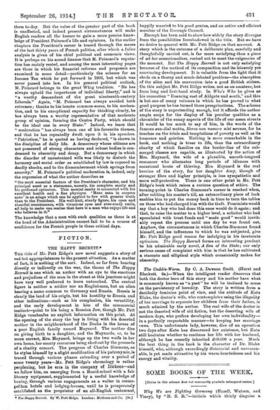FICTION.
THE HAPPY RECRUIT.* THE title of Mr. Pett Ridge's new novel suggests a story of red-hot appropriateness to the present situation. As a matter of fact, it is nothing of the sort. Indeed, so far from bearing directly or indirectly on the war, the theme of The Happy Recruit is one which an author with an eye to the emotions and prejudices of the man in the street at this juncture might have very well preferred to leave untouched. The central figure is neither a soldier nor an Englishman, but an alien bearing a name common to Germany and Russia. Russia is clearly the land of his origin, but his hostility to Russia and other indications—such as his complexion, his versatility, and the early development in him of the commercial instinct—point to his being a Russian Jew, though Mr. Pett Ridge vouchsafes no explicit information on this point. At the opening of the story the boy is living with his deserted mother in the neighbourhood of the Docks in the house of a poor English family named Maynard. The mother dies on giving birth to a daughter, and the Maynards, or, to be more correct, Mrs. Maynard, brings up the two waifs in her own home, her scanty resources being eked out by the proceeds of a charity concert. The progress of Charles Simmons, as he styles himself by a slight modification of his patronymic, is traced through various phases extending over a period of some twenty years—Mr. Pett Ridge's chronology is rather
perplexing, but he errs in the company of Dickens—and
we follow him, on emerging from a Board-school with a fair literary equipment, supplemented by a useful knowledge of boxing, through various engagements as a waiter in cosmo- politan hotels and lodging-houses, until he is prosperously established as the proprietor of an all-English restaurant,
• The Happy Recruit. By W. Pett Ridge, London : Methuen and Co. [es.]
happily married to his good genius, and an active and efficient member of the Borough Council.
Enough has been said to show how widely the story diverges from the possibilities foreshadowed in the title. But we have no desire to quarrel with Mr. Pett Ridge on that account. A story which is the outcome of a deliberate plan, carefully and thoughtfully carried out, is far more satisfying than a piece of ad hoc sensationalism, rushed out to meet the exigencies of the moment. But The Happy Recruit is not only satisfying because of the method of its composition and its leisurely yet convincing development. It is valuable from the light that it sheds on a thorny and much-debated'problem—the absorption of the alien and his conversion into a good British citizen. On this subject Mr. Pett Ridge writes, not as an amateur, but from long and first-hand study. In Who's Who he gives as his recreation " Roaming east of Aldgate and south," end this is but one of many volumes in which he Las proved to what good purpose he has turned these peregrinations. The scheme of the story is unpretending enough, but it affords the author ample scope for the display of his peculiar qualities as a chronicler of the sunny aspects of the life of our mean streets It would be too much to say of him, in the words of the famous sun-dial motto, Horas non numero nisi screws, for he touches on the trials and temptations of poverty as well as its humours and gaieties. Nothing is more remarkable in the book, and nothing is truer to life, than the extraordinary charity of which families on the border-line of the sub- merged classes are capable, as illustrated by the action of Mrs. Maynard, the wife of a plausible, smooth-tongued romancer who alternates long periods of idleness with occasional bouts of thieving. Mrs. Maynard is the real heroine of the story, for her daughter Amy, though of stronger fibre and higher principle, is less sympathetic and more self-protective. There is one other point in Mr. Pett Ridge's book which raises a curious question of ethics. The turning-point in Charles Simmons's career is reached when, after robbing his master's till, an extraordinary piece of luck enables him to put the money back in time to turn the tables on those who had charged him with the theft. Pessimists would say that a boy who had done this once would do it again ; and that, to raise the matter to a higher level, a solicitor who had speculated with trust funds and " made good" would inevit- ably repeat the process until one day be was found out. Anyhow, the circumstances in which Charles Simmons found himself, and the influences to which he was subjected, give Mr. Pett Ridge good reason for indulging in his inveterate optimism. The Happy Recruit forms an interesting pendant to his admirable early novel, A Son of the State; our only serious cause of complaint with him is that be has cultivated a staccato and elliptical style which occasionally makes for obscurity.


































 Previous page
Previous page